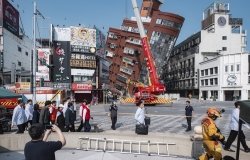Pakistan---A Vision for the Future
Transcript of Speech by President Musharraf
Overview
Transcript of Speech by President Musharraf
Director’s Forum with His Excellency Pervez Musharaff, president of Pakistan
In a speech largely focused on his country's internal affairs, Pakistani President Pervez Musharraf, in Washington to meet with President Bush, revealed that Pakistan has recently received indications of a possible nuclear test by India. Such a step, the president warned, would be "most untimely and may I also say provocative." Musharraf added that he has shared this information with the American government.
Musharraf was unclear whether the information available to Pakistan indicates India has already staged a test, or is planning one for the near future. India and Pakistan have each announced a ban on nuclear testing since their tit-for-tat tests in May 1998, which prompted widespread international condemnation and triggered U.S. sanctions.
Speaking to an audience numbering more than 650 at an event organized by the Woodrow Wilson Center and the Carnegie Endowment for International Peace, the Pakistani president outlined his vision of Pakistan as a liberal, tolerant, progressive, and dynamic Islamic state. Theocracy has no place in the governance of Pakistan, he asserted.
Pakistan faces a number of tasks if this vision is to be attained, Musharraf declared. Pakistan must curb religious fanaticism, extremism, and sectarian violence. It must extend the writ of government, which means that international issues (including Kashmir) must be addressed by government authorities, not private organizations or individuals. In addition, Pakistan needs a well-conceived national development strategy.
This development strategy must take the form of a "jihad" against poverty, exploitation, corruption, and disease. Its components must include economic revival, good governance, political restructuring, and poverty alleviation.
Musharraf underscored his determination to bring what he termed "true democracy" to Pakistan. He defined this term to include not only free elections, but also an effective, honest, functioning government. Only under these conditions, he declared, would Pakistan have the "essence of democracy." Indirectly justifying the wide powers he intends to retain even after national elections this fall, he spoke of the need to have an "effective" rather than a "rubber stamp" presidency.
Turning to regional issues, Musharraf declared that Pakistan wants peace with India, but that it is impossible to have peace without recognizing that Kashmir is the "core issue" between the two long-time rivals. Bilateral efforts over thirty years to resolve the festering Kashmir issue have failed, he insisted. Only "mediation or facilitation" by a third party will break the impasse.
Turning to the current tensions in the region, the president remarked that the December 13 terrorist attack against the Indian parliament was "certainty condemnable," but that this should not be used as an excuse for Indian "brinkmanship," which was "rather irresponsible."
This address was the first event in Musharraf's first-ever visit to Washington. Wilson Center director Lee H. Hamilton and Carnegie Endowment president Jessica Matthews co-hosted the event.
Hosted By

Indo-Pacific Program
The Indo-Pacific Program promotes policy debate and intellectual discussions on US interests in the Asia-Pacific as well as political, economic, security, and social issues relating to the world’s most populous and economically dynamic region. Read more
Thank you for your interest in this event. Please send any feedback or questions to our Events staff.










